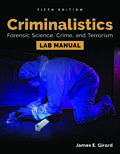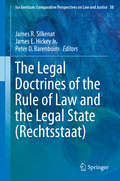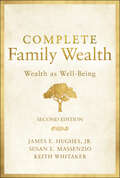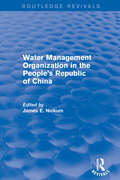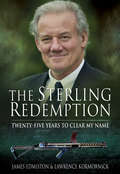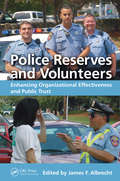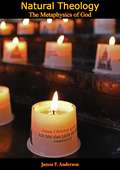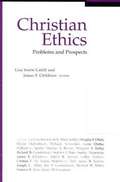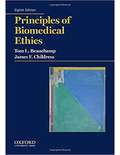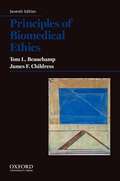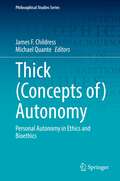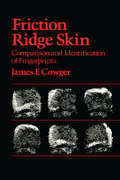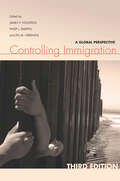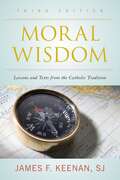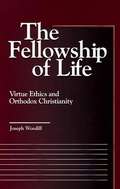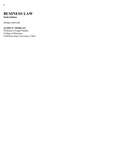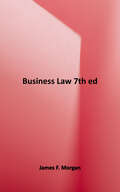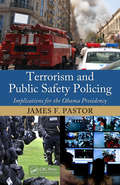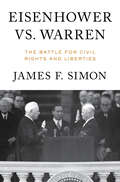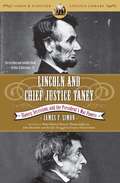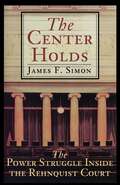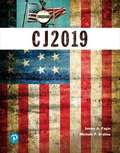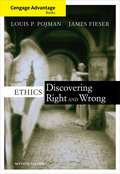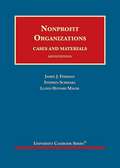- Table View
- List View
Lab Manual eBook for Criminalistics: Forensic Science, Crime, and Terrorism - 365-Day Access
by James E. GirardLab Manual eBook for Criminalistics: Forensic Science, Crime, and Terrorism is a digital-only eBook lab manual with 365-day access. This Lab Manual eBook consists of 12 related experiments created by James Girard and arranged by chapter. It provides hands-on practice to students, allowing them to apply key concepts presented in the text or eBook.
The Legal Doctrines of the Rule of Law and the Legal State (Rechtsstaat)
by James R. Silkenat James E. Hickey Peter D. BarenboimThis book explores the development of both the civil law conception of the Legal State and the common law conception of the Rule of Law. It examines the philosophical and historical background of both concepts, as well as the problem of the interrelation between the two doctrines. The book brings together twenty-five leading scholars from around the world and provides both general and specific jurisdictional perspectives of the issue in both contemporary and historical settings. The Rule of Law is a legal doctrine the meaning of which can only be fully appreciated in the context of both the common law and the European civil law tradition of the Legal State (Rechtsstaat). The Rule of Law and the Legal State are fundamental safeguards of human dignity and of the legitimacy of the state and the authority of state prescriptions.
Complete Family Wealth: Wealth as Well-Being (Bloomberg Ser.)
by James E. Hughes Jr. Susan E. Massenzio Keith WhitakerA primer for families of high net worth on how to manage their qualitative and financial wealth for generations The second edition of this foundational work, Complete Family Wealth: Wealth as Well-Being provides proven tools and best practices for families of means to use in maturing, maintaining, and managing personal and legacy wealth long into the future. The book is divided into three parts: the "what"—what is meant by family, wealth, and enterprise; the "who"—the persons crucial to family enterprise flourishing; and the "how"—specific practices families can use to enhance and grow family wealth. The second edition of this work places the health and well-being of the individual members of the family unit at the forefront of every aspect detailed within the book. A natural product of this focus is an increased awareness of the social complexities of wealth that have come to the fore in recent years, and the team of expert authors here address the responsibility of private wealth to the public good. In addition, Complete Family Wealth's second edition provides readers with: A new chapter on "the big reveal," suggesting ways to encourage positive, life-affirming reception of the revelation of present or future wealth An additional chapter on preserving the beloved family vacation home Two new appendices: "Fiduciary Course Curriculum," dedicated to enhancing the education of trustees and beneficiaries; and "Key Practices for Families During Challenging Times," a response to the pandemic but relevant to all trying periods for families Examples that make these practices accessible to a broad audience across the wealth spectrum. Having shaped the language used by families and their advisors with the first edition, Complete Family Wealth's second edition is essential reading for families of high net worth and their financial advisors. It will also be of interest to family offices, fund managers, as well as private investors.
Revival: Water Management Organization in the People's Republic of China (Routledge Revivals)
by James E. NickumCombining a journalist's view of major trials with a political-legal analysis, this text gives a picture of the politics of justice in Russia. Coverage of major court cases ranges from the 1961 trial of the "currency speculators" to the Communist Party trial of 1992.
The Sterling Redemption: Twenty-Five Years to Clear My Name
by James Edmiston Lawrence KormornickThe fight against a false accusation in the Arms-to-Iraq affair. &“A searing expose of one of the most shameful and cynical prosecutions of modern times.&” —The Guardian This is the untold true story of James Edmiston who suffered an extraordinary miscarriage of justice in 1983 when senior officials blocked vital witnesses coming to his trial which led to a personal tragedy; a broken marriage, and the loss of a business. The book explains how he was wrongly charged with alleged illegal exports to Iraq, and then took on the establishment against seemingly impossible odds for twenty-five years, to establish his innocence and to win record compensation from the British government in a truly remarkable case. Divorced and bankrupted, he is now rebuilding a shattered life, nearly thirty years later. This extraordinary story is a fascinating insight into government and the abuse of power and is based on many original sources including the Scott Report and Judgment of the Court of Appeal (criminal). The co-author, Lawrence Kormornick, is a Solicitor-Advocate (civil) who has represented Edmiston and several other victims of the Arms-to-Iraq prosecution scandal against the government and has a unique insight into these cases. Packed with ironies, twists of fate, and many unanswered questions it is a compelling read for anyone interested in political intrigue and abuse of power, miscarriage of justice, and learning about how an individual took on the state and won. &“A true story of alleged skulduggery and, possibly, criminal acts in the form of perverting the course of justice by the authorities and it should be bedside reading for everybody who believes in the rule of law.&” —The Law Society Gazette
Police Reserves and Volunteers: Enhancing Organizational Effectiveness and Public Trust
by James F. AlbrechtReductions in police department funding have raised the importance of volunteers in enhancing organizational performance, improving community trust and confidence, and at times accomplishing basic tasks to maintain public safety and security. During a period when police administrators are asked to do more with less, and to engage in smarter, community-oriented policing, citizen volunteers are an invaluable resource. Police Reserves and Volunteers is an invaluable primer for those looking to understand the benefits and challenges involved in the use of the volunteers within global law enforcement agencies. Using cases from a range of specialists and precincts, this edited volume provides a rare window into police administration from the state legislation that regulates police reserves in California to the local models observed in many counties and cities across the United States. Police Reserves and Volunteers offers volunteers, local elected officials, and law enforcement straightforward guidelines to enhance police goals and build public trust in local communities.
Natural Theology: The Metaphysics of God
by James F. AndersonIn this book my sole aim is to present clearly and succinctly for students some central arguments and truths about God in so far as He is known to us in the light of reason. This pedagogical purpose dictates a great deal of compression, lest the student be lost in a labyrinth of dialectical and historical discussion, however important that may be in itself. But compression need not mean oversimplification. It does mean condensing, abridging, epitomizing. This has been done deliberately, in the interest of the student.
Christian Ethics: Problems and Prospects
by Lisa S. Cahill James F. ChildressThis fresh analysis of the "state of the question" in religious ethics charts the course for future study and exploration in the field. Written in honor of James Gustafson, who provides a conclusion, these 22 original and tightly argued essays examine hotly debated controversies on a wide range of topics, from sources of theological ethics to the moral life. At the core of these complementary perspectives is the ever-increasing tension between the particularity of religious and philosophical traditions and the universality of moral discourse. Designed for classroom use.
Principles Of Biomedical Ethics
by Tom L. Beauchamp James F. ChildressPrinciples of Biomedical Ethics provides a highly original, practical, and insightful guide to morality in the health professions. Acclaimed authors Tom L. Beauchamp and James F. Childress thoroughly develop and advocate for four principles that lie at the core of moral reasoning in healthcare: respect for autonomy, nonmaleficence, beneficence, and justice. Drawing from contemporary research--and integrating detailed case studies and vivid real-life examples and scenarios--they demonstrate how these prima facie principles can be expanded to apply to various conflicts and dilemmas, from how to deliver bad news to whether or not to withhold or withdraw life-sustaining treatments. <p><p> Ideal for courses in biomedical ethics, bioethics, and health care ethics, the text is enhanced by hundreds of annotated citations and a substantial introduction that clarifies key terms and concepts.
Principles of Biomedical Ethics
by Tom L. Beauchamp James F. ChildressBuilding on the best-selling tradition of previous editions, Principles of Biomedical Ethics, Seventh Edition, provides a highly original, practical, and insightful guide to morality in the health professions. Acclaimed authors Tom L. Beauchamp and James F. Childress thoroughly develop and advocate for four principles that lie at the core of moral reasoning in health care: respect for autonomy, nonmaleficence, beneficence, and justice. Drawing from contemporary research--and integrating detailed case studies and vivid real-life examples and scenarios--they demonstrate how these prima facie principles can be expanded to apply to various conflicts and dilemmas, from how to deliver bad news to whether or not to withhold or withdraw life-sustaining treatments. Illuminating both theory and method throughout, Principles of Biomedical Ethics, Seventh Edition, considers what constitutes moral character and addresses the problem of moral status: what rights are due to people and animals, and when. It also examines the professional-patient relationship, surveys major philosophical theories--including utilitarianism, Kantianism, rights theory, and virtue theory--and describes methods of moral justification in bioethics. Ideal for courses in biomedical ethics, bioethics, and health care ethics, the text is enhanced by hundreds of annotated citations and a substantial introduction that clarifies key terms and concepts.
Thick: Personal Autonomy in Ethics and Bioethics (Philosophical Studies Series #146)
by James F. Childress Michael QuanteThis book explores, in rich and rigorous ways, the possibilities and limitations of “thick” (concepts of) autonomy in light of contemporary debates in philosophy, ethics, and bioethics. Many standard ethical theories and practices, particularly in domains such as biomedical ethics, incorporate minimal, formal, procedural concepts of personal autonomy and autonomous decisions and actions. Over the last three decades, concerns about the problems and limitations of these “thin” concepts have led to the formulation of “thick” concepts that highlight the mental, corporeal, biographical and social conditions of what it means to be a human person and that enrich concepts of autonomy, with direct implications for the ethical requirement to respect autonomy. The chapters in this book offer a wide range of perspectives on both the elements of and the relations (both positive and negative) between “thin” and “thick” concepts of autonomy as well as their relative roles and importance in ethics and bioethics. This book offers valuable and illuminating examinations of autonomy and respect for autonomy, relevant for audiences in philosophy, ethics, and bioethics.
Friction Ridge Skin: Comparison and Identification of Fingerprints (Practical Aspects Of Criminal And Forensic Investigation Ser. #Vol. 2)
by James F. CowgerHere is a complete guide to the collection, classification, and comparison of friction skin prints and the determination of identity and nonidentity. It discusses: the cause and significance of variations in prints; the importance of class characteristics in print; the application of probability in decision making; and photographic techniques and considerations.
Controlling Immigration: A Global Perspective, Third Edition
by Philip L. Martin James F. Hollifield Pia M. OrreniusThe third edition of this major work provides a systematic, comparative assessment of the efforts of a selection of major countries, including the U.S., to deal with immigration and immigrant issues— paying particular attention to the ever-widening gap between their migration policy goals and outcomes. Retaining its comprehensive coverage of nations built by immigrants and those with a more recent history of immigration, the new edition pays particular attention to the tensions created by post-colonial immigration, and explores how countries have attempted to control the entry and employment of legal and illegal Third World immigrants, how they cope with the social and economic integration of these new waves of immigrants, and how they deal with forced migration.
Moral Wisdom: Lessons and Texts from the Catholic Tradition
by James F. Keenan SjThis book introduces readers to moral theory through a Catholic lens. In a warm, conversational style, Father Keenan shares a wealth of stories and examples to highlight the resources in the Catholic tradition for developing moral wisdom. Connecting formative influences of the Catholic heritage with themes of love, consciences, sin, and suffering, the book helps readers appreciate what gives meaning to our lives. The third edition has been revised throughout to help the reader better understand how to develop and apply moral wisdom in real life. It features additional examples, as well as new material on the teachings of Pope Francis. Chapters on the Ten Commandments and the teachings of Jesus have been re-worked in light of new scholarship. The book also features a new final chapter, Moral Agency, which addresses making practical decisions based on the lessons and texts from the book. Each chapter includes study questions to help readers further reflect on key themes.
The Fellowship Of Life: Virtue Ethics And Orthodox Christianity
by Joseph Woodill James F. KeenanBringing Orthodox Christianity into the recent dialog on virtue ethics, Joseph Woodill investigates the correspondences between the Eastern Orthodox tradition and contemporary virtue ethics, and he develops a distinctly Orthodox vision of theological ethics. This book fills a vacuum in our understanding of the Eastern Church by revealing themes, persons, and insights that offer resources for a contemporary moral theology. Reviewing the Eastern tradition from patristic times to the present, Woodill shows its relevance to contemporary virtue ethics and identifies both differences and similarities between Orthodox and other -- Catholic, Protestant, and Jewish -- virtue ethics.
Business Law
by James F. MorganWe are excited to bring you the sixth edition of this book. The previous edition was used in business law and legal environment of business courses throughout the nation. The changes made in the sixth edition are geared to better meet the needs of instructors and students. <p><p> Four changes deserve specific mention: Latest Legislative and Administrative Developments: As you might expect, over the past few years, the law in the United States and within the international community has evolved, and exciting dimensions of the business/law dynamic have developed. This edition also captures the latest developments in legislative (e.g., the Defend Trade Secrets Act of 2016) and administrative fronts. Current Cases: The sixth edition includes recent U.S. Supreme Court decisions (several from 2017) as principal cases, along with new cases from other federal courts and various state courts. More Graphical Presentations: A host of new tables, exhibits, and other visual depictions of important concepts are included in this new edition. Reorganization of Uniform Commercial Code Materials: Recognizing that many law courses - particularly those aimed at accounting students - focus on the Uniform Commercial Code, the sixth edition presents Uniform Commercial Code (and related) chapters together. <p><p> We believe we have improved readability of this edition through a vigorous process of editing, in both content and grammar realms. The sixth edition continues our tradition of offering an expansive text that presents, in an interesting manner, the fascinating and ever-changing world of law within the business community. Welcome to the sixth edition!
Business Law 5th edition
by James F. MorganThe forty-six chapters in Business Law, fifth edition are divided into ten distinctive parts. These parts permit the reader to view chapters within a broader context as represented by the term chosen to describe the part. That is, this structure allows students to have a logical skeleton with which to see the "big picture" of business law, consisting of the major parts of the discipline along with specific chapters presented in each part of the text.
Business Law, Seventh Edition
by James F. MorganThe chapters in Business Law consist of three basic parts: text, cases, and problems. The text is written in a style designed for business students and students in related disciplines. The textual material is crafted to present both the richness of the law and the dynamic interaction between law and business. To the extent possible, the focus of the writing is directed toward introducing students of today to the legal issues they will face throughout their careers.
Terrorism and Public Safety Policing: Implications for the Obama Presidency
by James F. PastorThe trends, data, and battle-tested logic don't lie. A perfect storm of extremist ideologies is on the horizon that threatens to challenge the current state of public safety forcing police chiefs, public administrators, and security professionals to rethink their approach to policing the streets of America. Professor James Pastor, a recognized auth
Eisenhower vs. Warren: The Battle For Civil Rights And Liberties
by James F. SimonThe epic 1950s battle that would shape the legal future of the civil rights movement is chronicled here for the first time. The bitter feud between President Dwight D. Eisenhower and Chief Justice Earl Warren framed the tumultuous future of the modern civil rights movement. Eisenhower was a gradualist who wanted to coax white Americans in the South into eventually accepting integration, while Warren, author of the Supreme Court’s historic unanimous opinion in Brown v. Board of Education, demanded immediate action to dismantle the segregation of the public school system. In Eisenhower vs. Warren, two-time New York Times Notable Book author James F. Simon examines the years of strife between them that led Eisenhower to say that his biggest mistake as president was appointing that “dumb son of a bitch Earl Warren.” This momentous, poisonous relationship is presented here at last in one volume. Compellingly written, Eisenhower vs. Warren brings to vivid life the clash that continues to reverberate in political and constitutional debates today.
Lincoln and Chief Justice Taney
by James F. SimonThe clashes between President Abraham Lincoln and Chief Justice Roger B. Taney over slavery, secession, and the president's constitutional war powers went to the heart of Lincoln's presidency. James Simon, author of the acclaimed What Kind of Nation -- an account of the battle between President Thomas Jefferson and Chief Justice John Marshall to define the new nation -- brings to vivid life the passionate struggle during the worst crisis in the nation's history, the Civil War. The issues that underlaid that crisis -- race, states' rights, and the president's wartime authority -- resonate today in the nation's political debate. Lincoln and Taney's bitter disagreements began with Taney's Dred Scott opinion in 1857, when the chief justice declared that the Constitution did not grant the black man any rights that the white man was bound to honor. In the famous Lincoln-Douglas debates, Lincoln attacked the opinion as a warped judicial interpretation of the Framers' intent and accused Taney of being a member of a pro-slavery national conspiracy. In his first inaugural address, President Lincoln insisted that the South had no legal right to secede. Taney, who administered the oath of office to Lincoln, believed that the South's secession was legal and in the best interests of both sections of the country. Once the Civil War began, Lincoln broadly interpreted his constitutional powers as commander in chief to prosecute the war, suspending the writ of habeas corpus, censoring the mails, and authorizing military courts to try civilians for treason. Taney opposed every presidential wartime initiative and openly challenged Lincoln's suspension of the writ of habeas corpus. He accused the president of assuming dictatorial powers in violation of the Constitution. Lincoln ignored Taney's protest, convinced that his actions were both constitutional and necessary to preserve the Union. Almost 150 years after Lincoln's and Taney's deaths, their words and actions reverberate in constitutional debate and political battle. Lincoln and Chief Justice Taney tells their dramatic story in fascinating detail.
The Center Holds: The Power Struggle Inside the Rehnquist Court
by James F. SimonThe Center Holds provides an intimate look at who the Supreme Court justices are, how they have made critical decisions, and why, ultimately, the Rehnquist Revolution failed.Focusing on four key areas of civil rights and liberties--racial discrimination, abortion, criminal law, and First Amendment freedoms--TheCenter Holds provides an in-depth look at the Supreme Court documents that illustrate the battle between the old liberal order and emerging conservative majority, beginning in the early 1980s. James F. Simon, a former Time correspondent and contributing editor, ex-dean of New York Law School, and nationally recognized scholar of constitutional law, examines key decisions on civil rights and civil liberties in a readable, intimate look at some key Supreme Court Cases and includes absorbing descriptions of confidential memos and drafts gleaned from sources from within the court.
Cj 2019
by James Fagin Michele BratinaCJ 2019 engages students with real criminal justice issues using interactive components and eye-catching visuals. Students explore a repertoire of current events and the resulting challenges faced by practitioners in the subfields of law enforcement, correctional management and administration, and the US court system. Along the way, learners critically consider the cross-systems nature of crime, law, and justice as well as the benefits of integrative approaches to problem-solving. Building on CJ 2010, this 2019 edition adds current events, victimization theories, and significant new content representing changes to the field of criminal justice in 2017 and 2018. CJ 2019, 1st Edition, is also available via Revel(TM) , an interactive learning environment that enables students to read, practice, and study in one continuous experience.
Ethics: Discovering Right And Wrong
by Louis P. Pojman James FieserStudy ethics from a classic ethics text, written by one of contemporary philosophy's most skilled teachers, Louis P. Pojman, now revised by best-selling author and editor of the INTERNET ENCYCLOPEDIA OF PHILOSOPHY, James Fieser. ETHICS: DISCOVERING RIGHT AND WRONG, Seventh Edition, offers a concise yet comprehensive overview of the fundamental objectives and outlooks of ethical theory. Written with Pojman's hallmark engaging, conversational manner with strong supporting pedagogy, this book challenges students to develop their own moral theories and to reason through ethical problems for themselves. The text even-handedly raises critical questions and fosters independent thinking within a rigorous presentation that draws numerous examples from both classical and contemporary sources. This edition maintains the text's clarity and strengths with its non-dogmatic style and generous presentation of various positions. This revision includes more feminist and multicultural ethical perspectives.
Nonprofit Organizations, Cases and Materials (University Casebook Series)
by Stephen Schwarz James Fishman Lloyd MayerThe Sixth Edition of this widely used casebook includes the usual rich mix of materials and is adaptable to a survey course, a policy-oriented seminar, or a more specialized J.D. or LL.M tax class. Every major topic is accompanied by a skillfully developed problem set and lively notes, questions, policy discussion, and bibliographic references. Highlights of the Sixth Edition include: Coverage of all important developments since the last edition, including the impact of the COVID-19 pandemic on the nonprofit sector; recent legislation and final regulations on the new excise taxes on excessive executive compensation and large charitable endowments, and the unrelated business tax “silo” rules; major antitrust litigation against the NCAA and related legislative proposals to expand the rights of college athletes; and state law developments.Selective discussion of the American Law Institute’s forthcoming Restatement of the Law of Charitable Nonprofit Organizations.Division of the chapter on charitable tax exemptions into two chapters, separately covering affirmative requirements for tax exemption (Chapter 5) and limitations on exemptions and procedural requirements (Chapter 6).Updated author’s text addressing the robust policy debate over income inequality, “elite philanthropy,” and the implications for reform of the charitable deduction. Surveys of proposed tax legislation, including enhanced regulation of donor-advised funds and private foundations. Pruning of dated materials, more tightly edited cases and notes, and several new problems.
